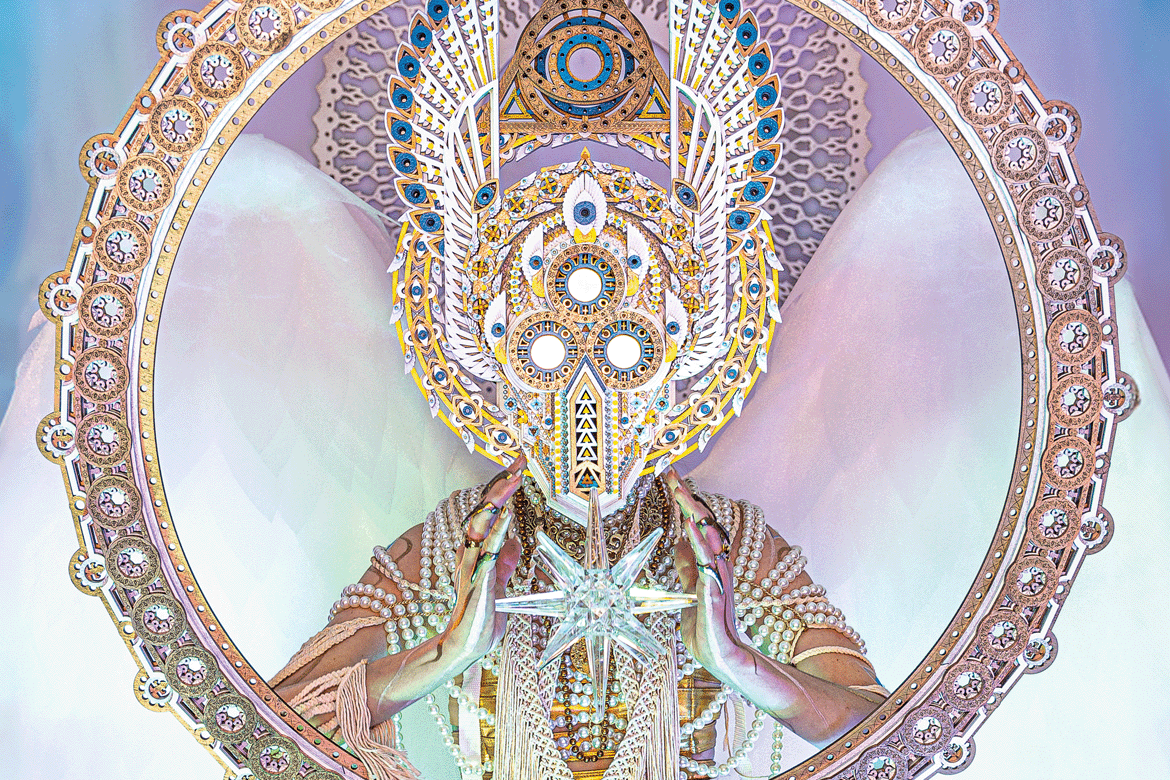“I’ll embrace all the ways that I’m broken, cut my hands up collecting the shards.”
One of the defining characteristics that has historically set Eidola apart from their contemporaries has been the interpolation of different religious and philosophical ideas into their own lore and lyricism. The resulting narrative has been the ongoing saga of the Alchemist and theArchitect—each reborn from the character Samsara following his death at the end of the band’s debut record The Great Glass Elephant—with the former being the protagonist of To Speak, To Listen (2017) and the latter, of course, the protagonist of the 2021 record of the same name. Bringing elements of science fiction into the fold, the point in the story The Architect leaves off sees its title character pursuing the Alchemist through a black hole after commandeering an interdimensional pyramid spacecraft with the help of the archangels Gabriel, Raphael, and Michael (yes, really).
An intentional exercise in how far they can push the boundaries of their sound on both ends of the sonic spectrum, the double albums Eviscerate and Mend each tread new ground in different ways while bringing the story of the Alchemist and the Architect to its grand conclusion. Whereas Eviscerate was notable for being the most outright heavy project the band has released to date, Mend is indeed its counterpart in presenting Eidola at their lightest and most accessible. But the story of the Alchemist and the Architect has always been presented as more of a yin and yang concept; both opposing and complementary, interconnected and each necessitating the need for the other in order to maintain equilibrium.
Like how Eviscerate’s sheer heaviness made its lighter moments all the more impactful, on the inverse, Mend’s heavier moments hit harder when interwoven throughout the diverse offering of soundscapes across its runtime. Eviscerate went all-in on the heaviness, employing drop-tuned seven-string guitars and an exponential increase in screaming vocals to give it its heft. In comparison, Mend takes multiple different approaches in expanding Eidola’s sound in the opposite direction; from dueling nylon-string guitars in “Kaleidoscope,” or moody, neon-soaked tracks befitting a theological sci-fi epic like “A Pearl In a Dead Sea” and “What It Means to Be Alone,” to the explosive one-two punch closing stretch of “Godhead: Final Temple” (the sixth and final installment in the “Temple” series of songs introduced on 2015’s Degeneraterra) and “Revelation: The Infinite Beauty of Oneness.”
Single “Prodigy” is arguably one of the more surprising cuts on the album, with its funky overtones and relatively spacious instrumentation feeling more in line with traditional genre offerings from Dance Gavin Dance or Royal Coda than what listeners have come to expect from Eidola. Vocalist Andrew Wells singing “like you ain’t a fucking straight up bitch” feels so out of place on an Eidola song, but mellifluous, layered harmonies manage to smooth out its delivery and maintain the track’s odd, funky-vaporwave crossover vibe.
A frequently touched upon theme throughout the band’s discography, tracks like “Empire of Light” and “The Faustian Spirit,” as well as “Prodigy,” take a confident stand against both self-doubt and outside critics alike. “Blood In the Water,” “Restore Me” and the aforementioned “Godhead” and “Revelation” grapple with forgiveness, redemption, and rebirth post-armageddon. “Blood In the Water” ends with one of the record’s heaviest passages, so naturally it then subsequently leads into the extended piano ballad “Renaissance,” whose cloyingly sweet sentiments overstay their welcome with a near four and a half minute long runtime. “My Father’s House” and “Revelation: The Infinite Beauty of Oneness” are jubilant; bright and hopeful with sparkling, effervescent instrumentals while the lyrics celebrate love and togetherness.
Perhaps it would be stating the obvious to say that most listeners’ overall enjoyment of the Eviscerate and Mend double album will hinge entirely on what aspects of Eidola’s sound they prefer. While the intentional sonic duality of the project should ensure that fans on either end of the spectrum should be satisfied, there has already been quite the range in reception; from fans who absolutely loved the heavier turn that Eviscerate took, to those who cast the record off as generic djentcore. Likewise, there are sure to be those who write Mend off as nothing more than a mainstream take on the Eidola sound, just as likely as there are to be those celebrating the record as a return to form.
Where Eviscerate explored the Alchemist’s reckoning following his corruption and transformation into an embodiment of death, hatred, and suffering, the crux of Mend’s humanist ethos lies in the strength found in love, forgiveness, and healing. The overarching lore of Eidola’s discography is certainly intensive, and worth a deeper dive if you’re into that sort of thing. But at the heart of the meticulously crafted narrative, and outside of the historical and theological figures and settings incorporated into it, the takeaway messages of the music have always been more universal and derived from the human experience in its totality—the good and bad, light and dark, yin and yang. In isolation, Mend is arguably one of the weaker releases in Eidola’s discography, and ends up not being quite as impactful as Eviscerate was. But viewed within the context of the larger narrative at play, Mend does manage to fulfill its duty as the counterbalance to its partner record and helps effectively set the stage for a grand finale that’s been twelve years in the making.
7.5/10
Mend is set to release this Friday January 17th via Blue Swan Records and Rise Records. You can find pre-orders for the record here.

